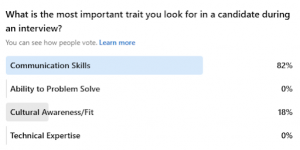
The skill that will end up getting you the job might be one you use everyday without noticing. Let it be the thing that sets you apart from the rest.
Imagine this… you are a recruiter with two outstanding candidates in front of you, bracing for their first interview. Their resumes have similar work experience and exemplary recommendations – how do you choose? Recruiters declare that the number one skill they look for when interviewing candidates is communication skills. Not expertise, or logical thinking, or even ability to problem solve. It is the ability to effectively communicate your thoughts, feelings, and ideas in a way that the listener can understand. How can such a mundane skill be so defining in the job world?
Communication is arguably the most transferable skill in the market today. Good communicators are also held to be great leaders, effective group members, and tend to excel at client relations. When a skill can encompass this many crucial positives in the job market, it is no wonder that job recruiters seek communication skills before all else.
Now that we know what the experts are looking for, how can we use this information to ace our own interviews? One of the best ways to test your own ability to communicate effectively is to simply turn on the camera and start talking. Record yourself giving a brief overview of yourself and your accomplishments as though you were speaking live to the recruiter. Try to include as much important information as you can about your career path thus far while keeping your sentences engaging and concise. As you watch the video back, keep note of your eye contact and non-verbal cues. Communication is 50% verbal and 50% non-verbal, so make sure what you are saying with your eyes and what you are saying with your mouth align!
It isn’t just what you say, but how you say it. Before the interview, research the company’s culture. Are they more formal, or do they prioritize comfortability in the workspace? For example, tech start-ups may require a more laid-back and adaptable persona while a law firm would prioritize professionalism over all others. Adjust your communication style accordingly. Though it is not as prioritized as communication skills, cultural fit into company culture is a huge skill recruiters look for in candidates. Are you making sure you are understood, or are you simply blathering into the abyss? The way you communicate with the recruiter will be indicative of the way you communicate with your co-workers, and most importantly, the way you communicate with your clients.
Communication encompasses a wide variety of traits, including your ability to listen. Be prepared for your interviewer to ask you questions about things brought up in the conversation, as well as key facts about their own company values and beliefs. If they bring up the importance of collaboration between departments, mention how important collaboration is to your own work style. Bring it up later in the conversation to demonstrate how you can contribute to the company’s goals while demonstrating your amazing listening capabilities! You can’t effectively communicate if you can’t listen!
At USPRO, we have seen firsthand how important strong connections are in advancing your career. Over the last decade, we’ve built trusted, long-lasting relationships with leaders in the defense, engineering, and IT industries, who rely on us to provide top talent. By partnering with USPRO, you instantly gain access to our extensive network, allowing you to both find your next opportunity and also expand your own connections.
Ready to start building connections and take your career to new heights? Contact USPRO today and let us navigate you through professional networking!
